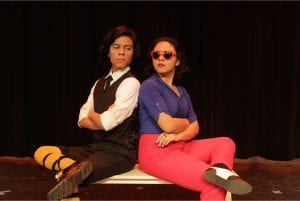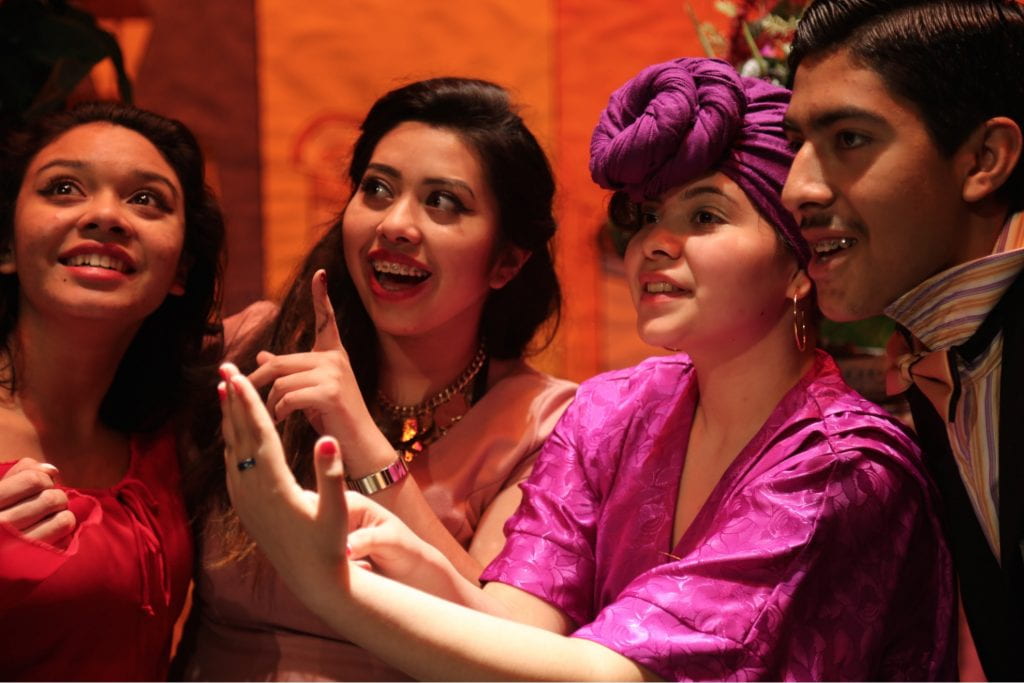Mauricio Garcia (17) normally would be found filling out college applications, but this week, he will be in yellow stockings and cross-gartered. He joins his peers in a cast and crew of students from Foshay Learning Center in South Los Angeles (many English language learners and aspiring first generation college kids) in Shakespeare’s comedy about a love triangle caused by its cross-dressing heroine. Mauricio said, “My role has pushed me into many uncertain moments where I discovered my own creative capacity. I learned I want to embrace this vulnerability in the next chapter of my academic career.”

(L-R) Malvolio, the ambitious steward (Mauricio Garcia, 17) squares off with Feste, the fool (Lilly Kate Diaz). Photo by Jaileane Aguilar.
The dual role of Viola/Cesario will be played on Friday’s show by Elise Lightburn (14), one of the youngest of the company said, “My effort at my craft made it possible to achieve this goal, despite my age.” Elise is in the eighth grade and has performed with the company since she was 11. Twelfth Night opened this week and will have two more shows Friday, January 29 and Saturday January 30. “Antic high junxes galore, mistaken identities abound, and all sorts of blurred lines—wink, wink!” enthused Cheryl Gonder, Foshay teacher, “An Illyria a la Cubano, this production is sure to please!”
2016 commemorates 400 years since the death of William Shakespeare, and the students’ work uniquely localizes this year’s global Bardolatry. This rare production culminates intensive scholarship of the surprisingly contemporary four hundred year work as students noted the play’s foregrounding of transgender identity and class mobility, traced modern links to Elizabethan’s obsession about bear-baiting or preoccupation with disguise as they craft their own versions of Shakespeare’s characters for the stage. In twelve days preceding the show, the students began to set the buzz about campus with a “Twelfth Night Carnival” (live serenades, jousting, human ring toss). Jacqueline Barrios, AP English teacher at Foshay and co-director of the USC NAI Theater Workshop said, “Learning happens when there’s paradox and novelty which performance makes available. Truly, the best way to study Shakespeare is to ‘play.’”
This Twelfth Night as aforementioned is set in a “Cuban” inspired world, made possible by rueda workshops from Contra Tiempo, a LA dance company along with student artwork in multiple aspects of the design: hand-painted backdrop and murals, recycled plastic bottle plaza lights, costumes curated from thrift shops or hand-sewn by parent volunteers. Live saxophone, guitar and vocals delivered the many songs of the play in translation, making this most tuneful of the comedies live up to its first line: “If music be the food of love, play on!” Ivonne Rodriguez, USC NAI parent, said, “Proper homage was paid to Shakespeare’s complex story through the brilliance of the direction seen in the colorful set design, soulful music and the flawless comedic timing from the young actors.”
Alumni (now USC students) supported the production through LATTE (Los Angeles Talented Thespian Ensemble). Jesus Garcia, founder and USC student said, “It is crucial for every student to discover themselves through self-expression. I founded LATTE in order to continue providing students with the opportunity to pursue their dreams in the arts and allow them to receive the well rounded education I had as a high school student.”
For many students at Foshay, also scholars at the USC Neighborhood Academic Initiative (NAI), a college preparatory pathway that links the university and the neighborhood, this will be the closest they have ever come to live theater, literature and the passion of performance. Artistic director of the play, and professional actor Paul David Story said, “Acting is truly listening and believing in the given circumstances of your character and the play. It’s wonderful to see our students do this, fully committing to their characters and their objectives. That’s what makes for great story telling, and brings the literature to life!”
